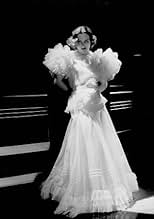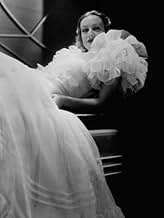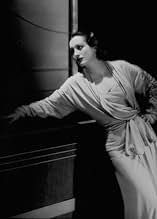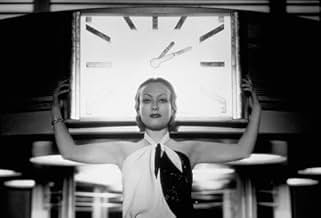Ajouter une intrigue dans votre langueA socialite begins a shipboard romance with a wealthy man, but is blackmailed by a former lover.A socialite begins a shipboard romance with a wealthy man, but is blackmailed by a former lover.A socialite begins a shipboard romance with a wealthy man, but is blackmailed by a former lover.
- Réalisation
- Scénario
- Casting principal
- Récompenses
- 4 victoires au total
Sidney Bracey
- Waiter
- (non crédité)
Edward LeSaint
- Dr. Sanders
- (non crédité)
Edgar Norton
- Darrow's Butler
- (non crédité)
Lee Phelps
- Dennis, Darrow's Chauffeur
- (non crédité)
C. Montague Shaw
- Ship's Officer at Christmas Party
- (non crédité)
Harry Stubbs
- Ship's Steward
- (non crédité)
Charles Williams
- Reporter
- (non crédité)
Avis à la une
Long unreleased (and it's still hard to find a decent print), and thus notorious, "Letty Lynton" does not quite live up to this notoriety. It does have a great ending, the kind of pre-code ending that makes you want to sit up and clap, and a hard-to-watch scene of Joan Crawford being slapped around by a man, but otherwise it's an undistinguished story, unimaginatively presented. **1/2 out of 4.
So many films of great movie stars are out of circulation for one reason of another. LETTY LYTTON is one of them. I have never seen it, although (from the sound of it it sounds interesting). I can though illuminate something of the background.
Marie Belloc Lowndes is recalled today for one novel (from a short story) entitled "THE LODGER". She was fascinated by crime and wrote books based on famous cases (like a younger contemporary, "Joseph Shearing"). THE LODGER was about the Jack the Ripper murders. Other novels of hers were turned into movies. THE STORY OF IVY became a film with Joan Fontaine as an unscrupulous poisoner (of her husband) - supposedly based on the Maybrick Murder Case of 1889.
LETTY LYTTON was based on the Madeleine Smith poisoning case of 1857 in Glasgow, Scotland. Madeleine was supposed to marry a Mr. William Minnoch, in a marriage approved by her very strict father (a leading architect). But she had been having very close relations with an Emile L'Angelier (foreign sounding for Scotland, but L'Angelier was from the Channel Islands of Great Britain). L'Angelier may have loved Madeleine, but he was also socially attracted to her position in Glasgow. He would not let her drop the relationship. Several times he visited her, and came home ill. The last time he died. Subsequently arsenic was found on his corpse. Love letters written by Madeleine led to her arrest. She was tried, but the jury (despite good reason) was not willing to find her guilty. They did not acquit either. Instead, she was found "Not Proven", which is a verdict on Scotland has. Madeleine eventually married an artist, George Wardle, until their divorce in the 1880s. She became a socialist (one of her friends in London was George Bernard Shaw). She married a second time, emigrated to America, and died in New York City (in the Bronx) in 1926 when in her nineties. She is buried there.
Certainly, in her later years, she did not have the wonderful wardrobe that was Ms Crawford's courtesy of MGM, but she had a reasonably quiet life. She fought a motion picture studio in the 1920s which wanted to make him a film about her career (it wasn't made). A woman of spirit (even if you do not think her innocent of murder). She did not know that LETTY LYTTON would appear in a film suggested by her story within a decade, nor that (in 1950) David Lean would make the definitive film about the case: MADELEINE.
Marie Belloc Lowndes is recalled today for one novel (from a short story) entitled "THE LODGER". She was fascinated by crime and wrote books based on famous cases (like a younger contemporary, "Joseph Shearing"). THE LODGER was about the Jack the Ripper murders. Other novels of hers were turned into movies. THE STORY OF IVY became a film with Joan Fontaine as an unscrupulous poisoner (of her husband) - supposedly based on the Maybrick Murder Case of 1889.
LETTY LYTTON was based on the Madeleine Smith poisoning case of 1857 in Glasgow, Scotland. Madeleine was supposed to marry a Mr. William Minnoch, in a marriage approved by her very strict father (a leading architect). But she had been having very close relations with an Emile L'Angelier (foreign sounding for Scotland, but L'Angelier was from the Channel Islands of Great Britain). L'Angelier may have loved Madeleine, but he was also socially attracted to her position in Glasgow. He would not let her drop the relationship. Several times he visited her, and came home ill. The last time he died. Subsequently arsenic was found on his corpse. Love letters written by Madeleine led to her arrest. She was tried, but the jury (despite good reason) was not willing to find her guilty. They did not acquit either. Instead, she was found "Not Proven", which is a verdict on Scotland has. Madeleine eventually married an artist, George Wardle, until their divorce in the 1880s. She became a socialist (one of her friends in London was George Bernard Shaw). She married a second time, emigrated to America, and died in New York City (in the Bronx) in 1926 when in her nineties. She is buried there.
Certainly, in her later years, she did not have the wonderful wardrobe that was Ms Crawford's courtesy of MGM, but she had a reasonably quiet life. She fought a motion picture studio in the 1920s which wanted to make him a film about her career (it wasn't made). A woman of spirit (even if you do not think her innocent of murder). She did not know that LETTY LYTTON would appear in a film suggested by her story within a decade, nor that (in 1950) David Lean would make the definitive film about the case: MADELEINE.
As others have said, 'Letty Lynton' for a long time was a lost, or at least an unavailable, film and banned at the time for legal reasons. At long last it was re-discovered and is now available, though deserving of a much better print than it has and it is easy to see why it became notorious and also why others have become fond of it. 'Letty Lynton' had so much going for it, especially the cast and also that it was directed by Clarence Brown who did direct some great films.
It also did not deserve to be made unavailable for so long and even though it has been positively received since it deserves to be better known. Absolutely agree with others about 'Letty Lynton' being surprisingly very good, considering that quite a lot of lost but then re-discovered are not particularly good this film actually surprised me pleasantly at how good it was. Although it is not perfect, 'Letty Lynton' is among the better lost then found films seen and is a great representation of all involved.
'Letty Lynton' may have some soapy dialogue in places.
Some of it is also not always realistic, although the premise was very interesting and very intriguingly and entertainingly executed on the most part it is not always easy to follow as in real life it would not always realistically happen (though it can do).
The cast though are exemplary. Joan Crawford, my primary reason for seeing it, never resorts to histrionics in my opinion yet also seems to be fully immersed in the drama, nothing is going through the motions like. Robert Montgomery's character is underwritten but he is charismatic and dashing, making the most of what he has. Nils Asther is a seductive but sinister villain that one loves to hate. And there are great supporting turns from the likes of May Robson and Lewis Stone, Robson is especially wonderful (fully embodying a type of role that she excelled in) and Stone gives his usual reserved and sympathetic performance. Brown's direction is sophisticated, sympathetic and graceful, he understands Crawford's strengths and accomodated them just as well as he did with Greta Garbo.
Moreover, 'Letty Lynton' looks fantastic. Absolutely loved the glossy glamour of the photography, clearly loving Crawford (without being self-indulgent) who in this stage of her career is possibly at her loveliest visually. Crawford's gowns are stunning and how she wears them also makes a big impact, there is a reason as to why one in particular is famous making for some very striking imagery. On the most part, 'Letty Lynton' is thoughtfully scripted and flows more naturally than most dialogue in lost then found films. The story never felt dull, and has a good deal of thrills, as well as having entertainment value and emotional investment. The ending is a vivid one and stays with you.
Overall, surprisingly very good and well worth tracking down. 8/10
It also did not deserve to be made unavailable for so long and even though it has been positively received since it deserves to be better known. Absolutely agree with others about 'Letty Lynton' being surprisingly very good, considering that quite a lot of lost but then re-discovered are not particularly good this film actually surprised me pleasantly at how good it was. Although it is not perfect, 'Letty Lynton' is among the better lost then found films seen and is a great representation of all involved.
'Letty Lynton' may have some soapy dialogue in places.
Some of it is also not always realistic, although the premise was very interesting and very intriguingly and entertainingly executed on the most part it is not always easy to follow as in real life it would not always realistically happen (though it can do).
The cast though are exemplary. Joan Crawford, my primary reason for seeing it, never resorts to histrionics in my opinion yet also seems to be fully immersed in the drama, nothing is going through the motions like. Robert Montgomery's character is underwritten but he is charismatic and dashing, making the most of what he has. Nils Asther is a seductive but sinister villain that one loves to hate. And there are great supporting turns from the likes of May Robson and Lewis Stone, Robson is especially wonderful (fully embodying a type of role that she excelled in) and Stone gives his usual reserved and sympathetic performance. Brown's direction is sophisticated, sympathetic and graceful, he understands Crawford's strengths and accomodated them just as well as he did with Greta Garbo.
Moreover, 'Letty Lynton' looks fantastic. Absolutely loved the glossy glamour of the photography, clearly loving Crawford (without being self-indulgent) who in this stage of her career is possibly at her loveliest visually. Crawford's gowns are stunning and how she wears them also makes a big impact, there is a reason as to why one in particular is famous making for some very striking imagery. On the most part, 'Letty Lynton' is thoughtfully scripted and flows more naturally than most dialogue in lost then found films. The story never felt dull, and has a good deal of thrills, as well as having entertainment value and emotional investment. The ending is a vivid one and stays with you.
Overall, surprisingly very good and well worth tracking down. 8/10
In Letty Lynton Joan Crawford in the title role abandons the shopgirl roles she
was famous for. Here she's quite the rich heiress and as the story opens she's
sailing home to New York after giving Nils Asther the air.
Half of Letty Lynton takes place aboard ship and it is there that she meets and falls for the equally rich Robert Montgomery. By the time the boat arrives in New York these two are ready to be wed and they break the news to the parents.
But Asther is persistent and he wants her back because no woman gives him the brush. It leads to some real trouble for Crawford.
It's always been of interest to me how the movie going public just ate up stories like this of the very rich for whom the Great Depression was not touching in the slightest. The only relatively poor people among the main players are District Attorney Lewis Stone and Crawford's maid Louise Closser Hale who is more of a confidante than her stern mother May Robson.
Sex was not the only thing censored by The Code when it was promulgated for the film industry. The actions of several people would not be tolerated when Crawford does get herself into a nice jackpot as she does in and as Letty Lynton.
Joan Crawford's legion of fans will approve of this Depression Era romantic melodrama.
Half of Letty Lynton takes place aboard ship and it is there that she meets and falls for the equally rich Robert Montgomery. By the time the boat arrives in New York these two are ready to be wed and they break the news to the parents.
But Asther is persistent and he wants her back because no woman gives him the brush. It leads to some real trouble for Crawford.
It's always been of interest to me how the movie going public just ate up stories like this of the very rich for whom the Great Depression was not touching in the slightest. The only relatively poor people among the main players are District Attorney Lewis Stone and Crawford's maid Louise Closser Hale who is more of a confidante than her stern mother May Robson.
Sex was not the only thing censored by The Code when it was promulgated for the film industry. The actions of several people would not be tolerated when Crawford does get herself into a nice jackpot as she does in and as Letty Lynton.
Joan Crawford's legion of fans will approve of this Depression Era romantic melodrama.
Letty Lynton (Joan Crawford) had men coming out of her ears. Everywhere she went men were clambering for her. One particular man, Emile Renaul (Nils Asther), whom she met abroad, was determined to possess her at all costs. She was once madly in love with him, then his veneer finish slowly faded and she was no longer in love with him, yet he was certainly still in love with (or infatuated with) her.
Letty peeled free of Emile in Rio de Janeiro and headed home for New York. On the ship she met Jerry (Robert Montgomery) who'd also fall in love with her. By the end of their two week voyage they were engaged to be married. Things got dicey for Letty when Emile was waiting at the dock for her in New York. Now she had to figure out a way to push Emile away for good while not letting on to Jerry she had such a relationship.
In this movie Letty was painted as the sympathetic character. She'd had a fling and was now indefinitely tied to this man whom she loved no more. The drama and suspense wasn't that of a "Fatal Attraction" or "Sleeping with the Enemy" in that Emile was going to do her bodily harm, the drama and suspense was in his ability to expose Letty. She was from a wealthy upstanding family and in the 30's, as I have learned, image is everything to high society. Letty's image would've been indelibly tarnished if Emile revealed to the world their tryst.
The problem I had with the "drama" was that I didn't see it as that big of a deal. Letty didn't want to lose Jerry, hence she wanted to keep Emile a secret. We, as the viewers, were supposed to feel the pain, angst, and desperation Letty had as she sought to free herself from Emile. I just couldn't feel it. I agree, it sucked to be in her position, but a big part of me was thinking, "Cut him off and deal with whatever he decides to reveal." I thought that because A.) I'm sure that the embarrassment would only be temporary B.) I believed Jerry would stick around and C.) Letty and Jerry's relationship never moved me. They met on a boat, had some good times, and decided to marry. The relationship was too simple for me to have any strong feelings about its survival.
Letty would deal with things her own way and find out just how much love she had, or didn't have, from Jerry.
Letty peeled free of Emile in Rio de Janeiro and headed home for New York. On the ship she met Jerry (Robert Montgomery) who'd also fall in love with her. By the end of their two week voyage they were engaged to be married. Things got dicey for Letty when Emile was waiting at the dock for her in New York. Now she had to figure out a way to push Emile away for good while not letting on to Jerry she had such a relationship.
In this movie Letty was painted as the sympathetic character. She'd had a fling and was now indefinitely tied to this man whom she loved no more. The drama and suspense wasn't that of a "Fatal Attraction" or "Sleeping with the Enemy" in that Emile was going to do her bodily harm, the drama and suspense was in his ability to expose Letty. She was from a wealthy upstanding family and in the 30's, as I have learned, image is everything to high society. Letty's image would've been indelibly tarnished if Emile revealed to the world their tryst.
The problem I had with the "drama" was that I didn't see it as that big of a deal. Letty didn't want to lose Jerry, hence she wanted to keep Emile a secret. We, as the viewers, were supposed to feel the pain, angst, and desperation Letty had as she sought to free herself from Emile. I just couldn't feel it. I agree, it sucked to be in her position, but a big part of me was thinking, "Cut him off and deal with whatever he decides to reveal." I thought that because A.) I'm sure that the embarrassment would only be temporary B.) I believed Jerry would stick around and C.) Letty and Jerry's relationship never moved me. They met on a boat, had some good times, and decided to marry. The relationship was too simple for me to have any strong feelings about its survival.
Letty would deal with things her own way and find out just how much love she had, or didn't have, from Jerry.
Le saviez-vous
- AnecdotesThis film, one of the seminal works of the pre-Code era, has been unavailable commercially since January 17, 1936, when a federal court ruled that MGM's script too closely resembled the play "Dishonored Lady" without having acquired the rights or given proper screen credit. The play, written by Edward Sheldon and Margaret Ayer Barnes for leading lady Katharine Cornell, opened on Broadway at the Empire Theatre on April 30, 1930, running for 127 performances. The U.S. copyright of the play will expire in 2025.
- Citations
District Attorney Haney: Lawyers with brains are scarce.
- ConnexionsFeatured in Joan Crawford: The Ultimate Movie Star (2002)
Meilleurs choix
Connectez-vous pour évaluer et suivre la liste de favoris afin de recevoir des recommandations personnalisées
- How long is Letty Lynton?Alimenté par Alexa
Détails
- Durée1 heure 24 minutes
- Couleur
- Rapport de forme
- 1.37 : 1
Contribuer à cette page
Suggérer une modification ou ajouter du contenu manquant


































